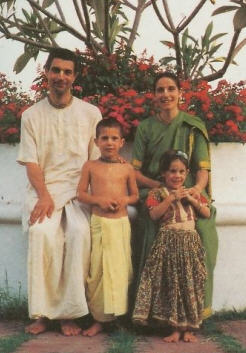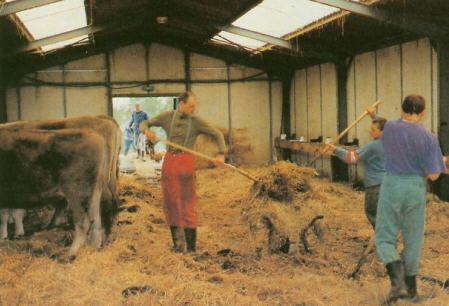
Organizers of the new Hare Krsna farm and village in France hope to develop an ideal place for families to live in Krsna consciousness.
Guru Sakti Dasa, 36, originally from Italy, joined the Hare Krsna movement seventeen years ago in Schloss Rettershof, Germany. He is a disciple of one of Srila Prabhupada's leading disciples, Harikesa Swami.
For almost ten years Guru Sakti distributed Krsna conscious books, mainly in the French-speaking area of Switzerland. Twelve years ago he married, and now he and his wife, Visnu Devi, have two children: a five-year-old son named Syamasundara and a four-year-old girl, Yamuna.
For almost seven years, Guru Sakti has been the president of the Hare Krsna temple in Zurich, Switzerland.
In 1993 he negotiated the purchase of a farm in France, known as Chateau Bellevue. The farm has started to become a Krsna conscious village, and Guru Sakti serves on the village council.
This interview took place in India last March.
BTG: What is the concept for your French village project?

Guru Sakti Dasa and his Family
Guru Sakti Dasa: We want to create a place where families can settle down, have their own houses, do some business, send their children to a Krsna conscious school, and at the same time live in the association of devotees.
I got involved in community development four years ago because I saw the need for such communities in the Krsna consciousness movement. People join a temple, get married, and then go out again. And somehow it's easy to get entangled in many activities just to maintain your family. Then you can become isolated and have difficulty keeping your Krsna conscious standards.
So we want to create a place where devotees can live peacefully in a natural environment and develop their loving relationship with Krsna and other devotees. In this way we can show how to practically apply our philosophy. We can show people that our philosophy is not limited to temple life or monastic life. We can demonstrate how to live according to Krsna's ideal for society.
BTG: How many people live in the community?
GSD: About thirty some families and some unmarried devotees.
BTG: Do the devotees living on the project own their own land?
GSD: At present everything belongs to the Society, to ISKCON. But we plan to divide the property, sell plots to individual families, and keep a central section as the direct property of the Deity.
BTG: Are you looking for a certain kind of people to join the community?
GSD: We want people to come who will take advantage of the community but who also have something to give. That means people who are qualified and experienced and can contribute materially and spiritually.
We do best with mature devotees who know what they want and can understand what we're trying to do. We explain what they can expect from us, what we expect from them, and in this way everything is clear.
BTG: What rules do you expect people to follow to live in the community?
GSD: One has to follow the four regulative principles,* but one doesn't have to come to the daily morning program or chant sixteen rounds a day. Of course, when people are initiated we expect them to follow the program and chant sixteen rounds. But this place should be broad enough to allow many friends, devotees, and congregational members to come help in some way and gradually become more and more involved in Krsna conscious life. In the association of devotees they will become purified and automatically take up the chanting and the rest of the program.
*Devotees initiated in the Hare Krsna movement vow to follow four principles no intoxicants, no meat-eating, no illicit sex, and no gambling. They also attend an early-morning program of classes and group chanting, and chant a strand of 108 meditation beads at least sixteen times a day.
BTG: How is the community governed?
GSD: For now we have a village council that meets twice a month. The department heads and senior devotees are on the council. The community is still too small to have a mayor, but in the future we will have one.
BTG: How does your economy work? How is the farm supported?
GSD: From the beginning we organized various departments that are financially independent to avoid a centralized treasury. Decentralization lets devotees take immediate responsibility for their lives. Everyone on the farm is economically independent, so everyone has to be productive; otherwise he cannot maintain himself. This is a healthy challenge to the development of the individual.
Of course, there are some expenses that affect the entire project. So our central administration rents land and rooms to the various devotees and departments, and in this way the regular income covers the insurance, taxes, electricity, and whatever other expenses there are.
BTG: What sort of work is going on now? How are people earning a living?

GSD: We have a preaching department, a kitchen department, a cow department, an agriculture and garden department, and a management department. Only the managers, who take care of legalities and finances, are maintained by the temple budget. The preaching department takes care of itself. The kitchen department gets money by cooking for the other members of the community. The cows from our previous farm are old and somewhat unproductive, so the Swiss temples maintain the cow department. And the agriculture and garden department maintains itself by selling vegetables and flowers to community members and the temple in Zurich.
BTG: What are your economic plans for the future?
GSD: We want to set up businesses related to agriculture and make products we can market professionally. Of course, first we want to sell to the devotee community and congregational members, but we can expand and sell to stores. Mainly we want to depend on agriculture, because that is the most secure and the least artificial economic platform.
BTG: What sort of agricultural work is going on now at the farm?
GSD: In the first year we produced a big quantity of grains, vegetables, and flowers for the Deities and devotees in Zurich. This year we have more of an infrastructure, so we'll produce even more.
Our aim is to grow all the food needed for the devotees in the Swiss temples for the whole year. We especially want to provide for the book distributors so they can stay healthy and strong and distribute many books for many years. The more we become aware of the unhealthy ways that food in the materialistic society is produced, the more we want to eat our own food so we know what we're eating.
BTG: What's your attitude toward the use of technology?
GSD: We want to get rid of needless technology, but that has to happen gradually, as people learn to work with natural means. Why work hard in factories in the name of progress and forget about God? Here we want to restore God consciousness and a natural means of earning one's livelihood.
BTG: What role do you play on the farm?
GSD: My role mainly is to inspire devotees, give them a vision, and help them settle at the farm. I also take care of finances, construction, administration, organization, and legal affairs.
In the beginning you have to put a lot into organizing. But as the project takes shape and stands more on its own say in another year I hope that other people can take up the management and I can do more counseling. I am also involved in getting the school established.
BTG: So far, then, you don't have a school.
GSD: Not yet. We want to develop a gurukula, of course, a Krsna conscious school. Otherwise, where will our kids go for schooling? So first we'll start a day school, then later add a boarding school. If we have a good school, automatically devotees and friends will settle at our place and enroll their children. That will make the project a success.
Devotees need communities, and children need a Krsna conscious education. We can't expect the renounced members of our movement to see to this; it has to come from the householders' side. So more and more senior householders should take this need seriously and invest their time and energy into developing communities and schools. Prabhupada gave us many wonderful instructions in this regard. If we discuss his instructions and how to implement them, then Krsna will give us the intelligence to make them happen.
Strategic Location
The chateau sits in a good location for spreading Krsna consciousness. It is near the Swiss and German borders and is three hours from Zurich, two hous from Basel, two hours from Geneva and Lausanne, and two hours from Paris. The nearest town is Dole, with forty thousand inhabitants, just ten minutes by car. And two bigger towns, Dijon and Besancon, about twenty minutes away, have about four hundred thousand people.
An important highway passes near the project. It comes from northern Germany and goes to southern Spain. So the Swiss and Germans who go on holiday to southern France or Spain take that highway.
The devotees plan to attract tourists by advertising their guesthouse and vegetarian restaurant. The project is already being used for Krsna conscious retreats and seminars.
